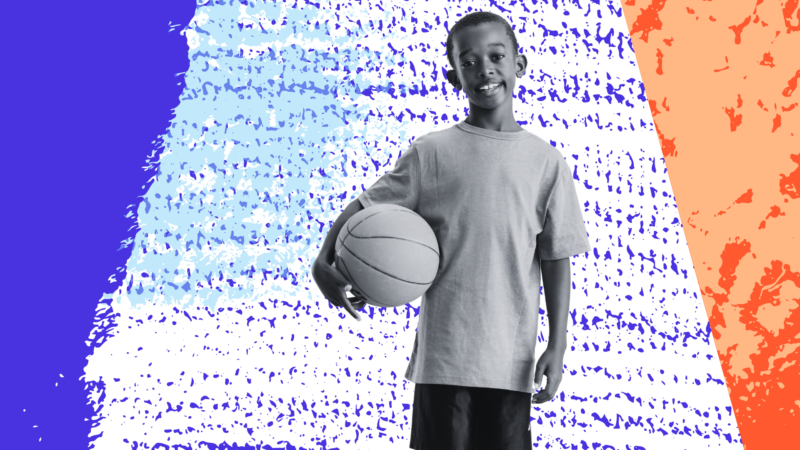What to Say to Young Athletes About Body Image, Food & Exercise
Published February 11, 2021 | Last Updated September 18, 2025

Kids aren’t born worrying about carbs, calories, or body size. They’re born with energy to move, curiosity to explore, and pride in what their bodies can do.
What adults say to kids matters. Coaches, parents, and teachers often wonder what to say to young athletes about food and body image.
The right words shape how kids think about food, body image, and exercise. This influence is powerful, but it doesn’t have to feel overwhelming.
Sometimes, knowing what to say in everyday moments at practice, in the car, or around the dinner table can prevent harm and build resilience.
Below, we share five positive phrases for young athletes—adapted for elementary, middle school, and high school—with explanations of how they support confidence, resilience, and healthy habits around food, body image, and exercise.
Jump to Section:

5 Positive Phrases for Elementary School Athletes (Ages 6–10)
1. “Healthy athletes come in all shapes and sizes.”
Why it matters: Redirect comparisons away from appearance and toward strengths and abilities.
At every age, kids notice differences in body size and ability. Comparison is natural, but it can quickly become harmful when kids focus on what they lack instead of what makes them strong and unique.
Unrealistic media images or genetically different body types can damage a young athlete’s self-esteem. Coaches and parents have the chance to step in: remind kids that they don’t have to look a certain way to be good athletes.
2. “Food helps you grow and gives your body energy to play your best.”
Why it matters: Connect food to energy and growth, not weight or appearance.
Creating a positive connection between food and energy is essential for young kids. Focusing on how food helps brains and bodies grow, think, move, and stay fueled keeps the emphasis on function, not size or appearance.
Research shows that when adults label foods as “good/bad” or “clean/unhealthy,” kids can develop anxiety and guilt around eating (Nationwide Children’s Hospital, 2020). For children in food-insecure homes, those labels can feel especially stressful. Shifting the conversation to seeing food as fuel helps all kids build a healthy relationship with food in sports and see eating as something that supports play, learning, and joy.
3. “Listen to your body. It will tell you if it’s hungry, tired, or full.”
Why it matters: Builds trust in body signals for lifelong healthy habits.
Many adults are disconnected from their body’s signals, but we can help kids stay tuned in to their body and use body cues with food and eating. Encouraging them to pause and notice what their bodies are saying, whether it’s hunger, fullness, or fatigue, teaches trust and respect for their own needs.
As a coach or parent, modeling this language helps kids feel empowered to respond to their bodies without shame or second-guessing.
4. “You work hard at [insert skill/attribute]. That makes you a great member of this team.”
Why it matters: Praises effort, teamwork, and skills instead of size or appearance.
Research shows that coaches’ assessments of ability are deeply tied to kids’ self-esteem (Psychology Today, 2025). Praising effort or teamwork shifts the focus from appearance or weight to qualities that truly matter.
This kind of recognition helps give kids agency, knowing they are valued for behaviors they can control. This builds confidence and motivation while protecting them against harmful body dissatisfaction.
5. “I believe in you.”
Why it matters: Encouragement fosters confidence and resilience.
Support and encouragement can feel small, but they are powerful. Kids look up to the adults around them. When they hear, “I believe in you,” they internalize that message and begin to believe in themselves and their abilities.

5 Positive Phrases to Support Middle School Athletes (Ages 10–13)
1. “Healthy, athletic bodies come in all shapes and sizes.”
Why it matters: Comparison intensifies at this age, and regular reminders protect self-esteem.
Comparison intensifies during middle school. Kids often measure themselves against peers or media images, which can hurt self-esteem if they believe only one “look” defines an athlete. Coaches and parents play a vital role in reframing this. Remind athletes that success is not tied to size or shape but to effort and persistence.
2. “Food is the fuel that powers your mind and body to perform at their best.”
Why it matters: Links food to performance rather than size or weight.
Linking food to how it helps the body perform and feel good, rather than appearance, size, or weight, gives tweens a healthier perspective. Food becomes something that supports endurance, energy, and strength, versus calories that should be counted and limited.
This simple reframing helps shift attention away from weight and can help athletes learn how to properly fuel their bodies to prevent fatigue, muscle loss, impaired recovery, and reduced performance (Logue et al., 2018).
3. “Different types of food are important for your mind and body to work well each day.”
Why it matters: Promotes balance and variety instead of “good/bad” labels.
Labeling foods as “good/bad” or “clean/unhealthy” can set kids up for anxiety, shame, or rigid eating patterns. It can also create challenges for kids who may not always have access to a wide variety of foods. Encouraging balance and variety allows athletes to see all foods as contributors to growth, strength, and performance.
4. “Your brain and body need a variety of activities to be strong.”
Why it matters: Counters pressure to specialize or overtrain.
Middle school athletes often feel pressure to specialize or train excessively in one sport. This can lead to burnout or even injury. By reinforcing the importance of moderation, variety, and rest, adults help tweens understand that recovery is part of becoming stronger.
5. “I believe in you.”
Why it matters: Reinforces self-worth through affirmation and trust.
Hearing affirmation from trusted adults matters deeply at this age. It builds confidence and helps tweens feel capable, valued, and supported, not defined by appearance or performance.

5 Positive Phrases to Encourage High School Athletes (Ages 13–18)
1. “Healthy, athletic bodies come in all shapes and sizes.”
Why it matters: Helps counter media pressure and peer comparison.
Teens are highly influenced by peers, coaches, and the media. Overemphasizing appearance or trying to change body shape can not only harm self-esteem but also detract from performance.
Consistently reminding teens that there’s no one “athlete body” helps protect them from harmful comparisons and reinforces a more inclusive, realistic view of health.
2. “Food is the fuel that powers your mind and body to perform at their best.”
Why it matters: Reinforces that food is about fueling strength, not restriction.
For teens, food messages are everywhere and are often negative. Reinforcing that food fuels energy, recovery, and peak performance shifts the focus away from restriction and onto strength.
3. “Your brain and body need a variety of foods and activities to work well.”
Why it matters: Encourages teens to listen to body signals and balance training.
Many teens struggle to notice or trust body signals. Coaches and parents can help them pause, reflect, and respond, whether that means eating more, resting, or diversifying activity. This approach builds resilience and helps prevent disordered patterns.
4. “Listen to your body; it knows what’s best. Rest is important, too.”
Why it matters: Normalizes rest, recovery, and moderation.
The teen years bring pressure to train harder, eat “cleaner,” and push limits. Reminding athletes that rest and moderation are just as important as training protects their health and enhances performance.
5. “Your [attribute the athlete controls: e.g., commitment, perseverance, hard work] makes us a better team.”
Why it matters: Praises unique contributions instead of physicality or appearance.
Comments about weight or appearance can harm self-image and lead to harmful behaviors. Instead, focus praise on skills, work ethic, and unique contributions. This specific, performance-based feedback builds confidence while keeping attention off appearance.

FAQs: What to Say to Young Athletes About Food and Body Image
How do I talk to kids about food without causing shame?
Use positive, neutral language, food as fuel, variety is good, and there are no “bad” foods. Remind them that food supports energy, growth, and joy.
What should I avoid saying?
Avoid comments on weight, labeling foods “good/bad,” or comparing athletes’ bodies.
How can coaches prevent body image issues in athletes?
Praise skills and effort vs. appearance or weight, model rest, and frame food as fuel.
What are positive body image tips for young athletes?
Focus on praising effort, teamwork, and skills, not appearance. Remind kids that athletes come in all shapes and sizes, and food is fuel to help them play their best.
Quick Checklist: 5 Positive Phrases to Say to Young Athletes
- “Healthy athletes come in all shapes and sizes.”
- “Food gives your body energy to play your best.”
- “Listen to your body’s signals.”
- “Your [skill] makes you a great teammate.”
- “I believe in you.”
These five phrases to say to children and teen athletes can be small but powerful tools for prevention. By using simple, inclusive, and supportive language, adults can help athletes of all ages build confidence, respect their bodies, and develop a healthy relationship with food and exercise.
Want to go deeper? Take our free Coach’s Challenge for a step-by-step guide on incorporating these practices to support positive body image for athletes of all ages.
References
-
Logue D, Madigan SM, Delahunt E, Heinen M, Mc Donnell SJ, Corish CA. Low Energy Availability in Athletes: A Review of Prevalence, Dietary Patterns, Physiological Health, and Sports Performance. Sports Med. 2018 Jan;48(1):73-96. doi: 10.1007/s40279-017-0790-3. PMID: 28983802. Available from: PubMed
-
Psychology Today. Youth Sports and the Development of Self-Esteem. Published January 2025. Available from: Psychology Today
-
Nationwide Children’s Hospital. Food Language and Body Image: How Words About Food Affect Kids. Published February 2020. Available from: Nationwide Children’s Hospital
Last updated on September 18, 2025

